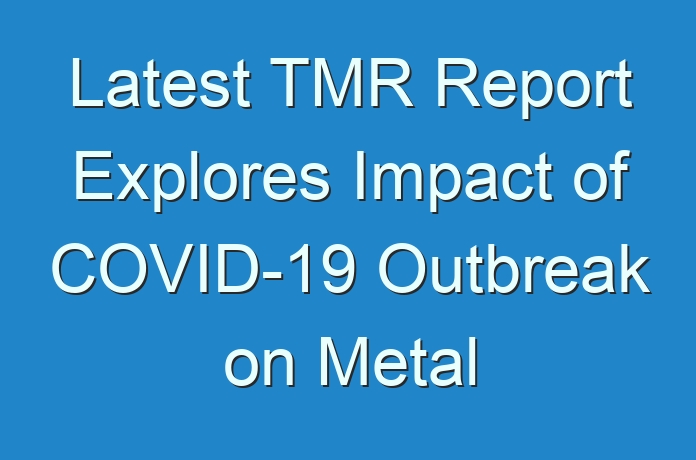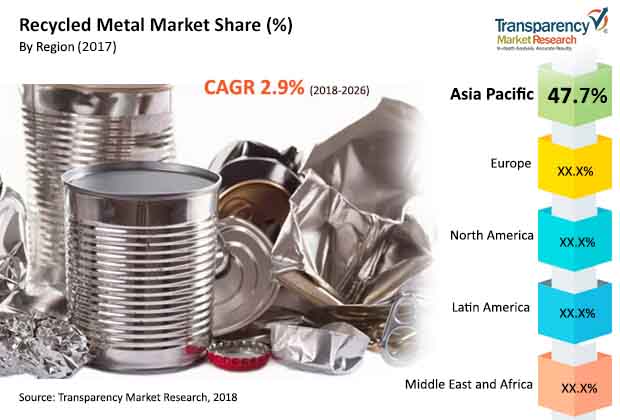
The recycled metal market was valued at US$ 713.44 Bn in 2017 is anticipated to expand at a CAGR of 3.5% during the forecast period, according to a new report published by Transparency Market Research (TMR) titled ‘Recycled Metal Market – Global Industry Analysis, Size, Share, Growth, Trends, and Forecast, 2018–2026’. Expansion in the recycled metal market is primarily driven by the increase in awareness about energy conservation through secondary production of metals, i.e. metal recycling. Manufacturers of metals have started adopting advanced energy management systems to lower their environmental footprint.
Request For Sample:https://www.transparencymarketresearch.com/sample/sample.php?flag=S&rep_id=11726
Energy Efficiency and Lower Greenhouse Gas Emissions in Metal Recycling to Drive Market Growth
A large amount of energy is required for the extraction of metal from ores. Energy consumed in metal production accounts for approximately 8.3% of the global energy consumption. Furthermore, the extraction process leads to the emission of greenhouse gases. The primary production of metals entails extraction of metals from metal ores, while secondary production involves the preparation of metals from scrap collection.

Buy Now :https://www.transparencymarketresearch.com/checkout.php?rep_id=11726<ype=S
Primary production of ferrous metals entails the reduction of iron oxide to iron by reducing agents such as coke, coal, and natural gas. The reduction takes place at a high temperature and entails high energy. However, the electric arc furnace (EAF) process is used in the secondary production of steel from scrap. The process consumes considerably less amount of energy. Thus, the energy requirement for primary production of ferrous metals is significantly higher than that for secondary production. Therefore, secondary production of ferrous metals through recycled metal leads to cost reduction.
Production of 100 kilo tons of aluminum from bauxite ore requires 4,700 terra joules of energy. Production of other non-ferrous metals such as copper, lead, nickel, tin, and zinc also entails significant amount of energy. Furthermore, the extraction process results in the emission of greenhouse gases. However, non-ferrous metals can be produced from scrap metal sources through a cost-effective method that consumes significantly low amount of energy. The emission of carbon dioxide is reduced during the secondary production of non-ferrous metals.
Explore Transparency Market Research’s award-winning coverage of the global Industry:https://www.prnewswire.com/news-releases/thriving-bakery-industry-together-with-increased-demand-for-confectioneries-drives-sales-avenues-in-baking-powder-market-tmr-301293640.html
Manufacturers of metals have started adopting advanced energy management systems to lower their environmental footprint. Recycled metal is projected to help industry players achieve their sustainability goals in the near future. This, in turn, is estimated to propel the recycled metal market in the next few years.
Rise in E-waste Generation to Boost Recycled Metal Market
Generation of e-waste has increased significantly over the last few years. Constant innovation in the electronics industry has resulted in digital revolution. Changing demands of consumers and constant improvement in technology are driving the electrical and electronic goods market. As a result, electronic goods with conventional technology are being replaced with new devices with improved technology. This, in turn, is driving the production of waste from discarded electronic and electrical equipment.
A well-designed and effective recycling system can encourage the reuse of electronic waste. Electronic waste management systems help prevent the loss of precious metals and lower the emission of greenhouse gases. Led by the rise in awareness about environmental concerns, governments of developed and developing countries are focusing on recycling of electronic waste to encourage resource conservation.
About Us :
Transparency Market Research is a global market intelligence company, providing global business information reports and services. Our exclusive blend of quantitative forecasting and trends analysis provides forward-looking insight for thousands of decision makers. Our experienced team of Analysts, Researchers, and Consultants, use proprietary data sources and various tools and techniques to gather, and analyze information.
Our data repository is continuously updated and revised by a team of research experts, so that it always reflects the latest trends and information. With a broad research and analysis capability, Transparency Market Research employs rigorous primary and secondary research techniques in developing distinctive data sets and research material for business reports.





